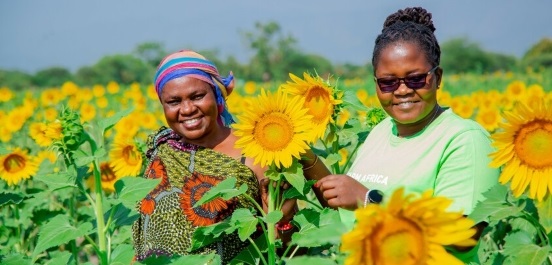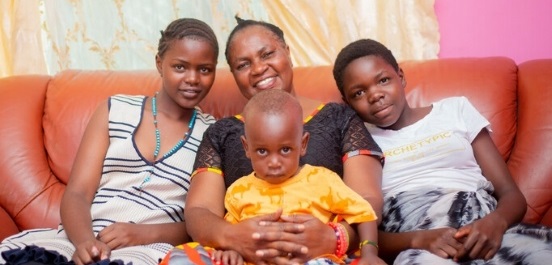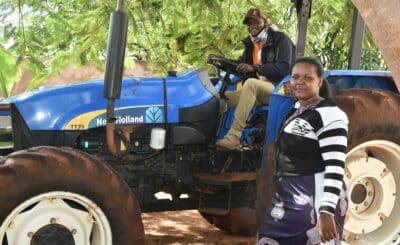Expert view
Tanzania
6 March 2023
International Women’s Day 2023 – Farmer to farmer: a conversation between NFU President Minette Batters and Mary Temu

By Helena Lawi, Gender Specialist, Farm Africa.
To celebrate International Women’s Day on 8 March, NFU President and Farm Africa ambassador, Minette Batters, sat down with Tanzanian small-scale farmer, Mary Temu, to talk about the challenges and opportunities female farmers face worldwide.
Watch their conversation here:
The conversation between the two farmers explores the ways that Farm Africa provides rural women in eastern Africa with the tools and support they need to break down barriers in agriculture. They also discuss Minette’s motivation to run the TCS London Marathon for Farm Africa on 23 April with fellow NFU colleagues.
Female farmers are no exception to the challenges that women continue to face across the world. In Africa, women face specific challenges in the agricultural sector including a lack of land ownership, decision-making power and access to markets and quality seeds. These often belong only to men.
Despite women providing the majority of labour in farming in Africa, bearing the brunt of arduous field work, men tend to ultimately own the crops that women produce – and the fields women work in.

Mary Temu (left) pictured with Helena Lawi (right).
There are specific crops that women can own, including beans and vegetables: crops that are grown to feed their families. But women usually can’t take ownership of crops that are grown to sell, such as sunflower, coffee and sorghum.
As women do not own the crops they produce, they do not have permission to take the crops to market to sell.
That’s why Farm Africa works across eastern Africa to support rural women. Our projects provide tools and support to empower female farmers to give them not only a say and a fair stake in their farming businesses, but in their lives overall.
In the Babati district of the Manyara Region of Tanzania, we are working with Mary, who is the sole provider for her four children.

Mary with her three daughters.
Before joining our sunflower project, Mary used local seeds and had no access to markets. She produced very little.
But since learning good agricultural practices and gaining access to high quality seeds and markets, Mary is now able to support her children through her poultry, rice and sunflower production.
At Farm Africa, we believe women become empowered through education, access to resources like land, and market opportunities.
Self-confidence also plays a big part in empowerment. We see women developing their self-confidence by taking part in women’s groups, being inspired by other women who have had success and hearing how they have overcome discrimination. With this support, we see the positive impact our projects have on women first-hand.
For example, in the Ikungi District of Tanzania we are working with UN Women to close the gender gap in the sunflower sector and get women engaged in not only growing sunflowers but also selling and processing the seeds.
We kicked off the project by doing awareness training sessions with men on the benefits of giving women land. To start with, the men only gave women small plots. But after they saw how much the family could earn from increased production, they recognised the benefits of giving more land to women.
With more access to land, comes access to money and when women earn money, it is used to benefit the whole community. You see the change in families; full diets, shelter, clothes.
You see children going to school. Indeed, Mary budgets her money and is now able to pay for her children’s school fees through income she makes from farming.

Mary at her farm in Babati.
Farm Africa also helps women to save in groups and issue loans to each other to invest in each other’s small businesses. Having other sources of income apart from farming means women are more resilient to climate change, as they have other sources of income to fall back on if harvests fail due to drought.
Unfortunately, female farmers in eastern Africa see the impact of climate change on a daily basis. But with access to drought-tolerant, high-quality seeds and training in post-harvest handling and good agricultural practices, female farmers are not only increasing their productivity, but are building their climate resilience and food security for themselves, their families and their communities.
If you would like to show your support for female farmers in eastern Africa this International Women’s Day, head to Minette’s fundraising page for the London Marathon to sponsor the NFU team.

Minette Batters pictured with NFU Vice President David Exwood, who is also running the London Marathon for Farm Africa. Photo: Lawrence Looi / NFU.
If you would like to make a donation to Farm Africa please donate below. All donations will go towards building resilient and brighter futures for farming families across eastern Africa.




